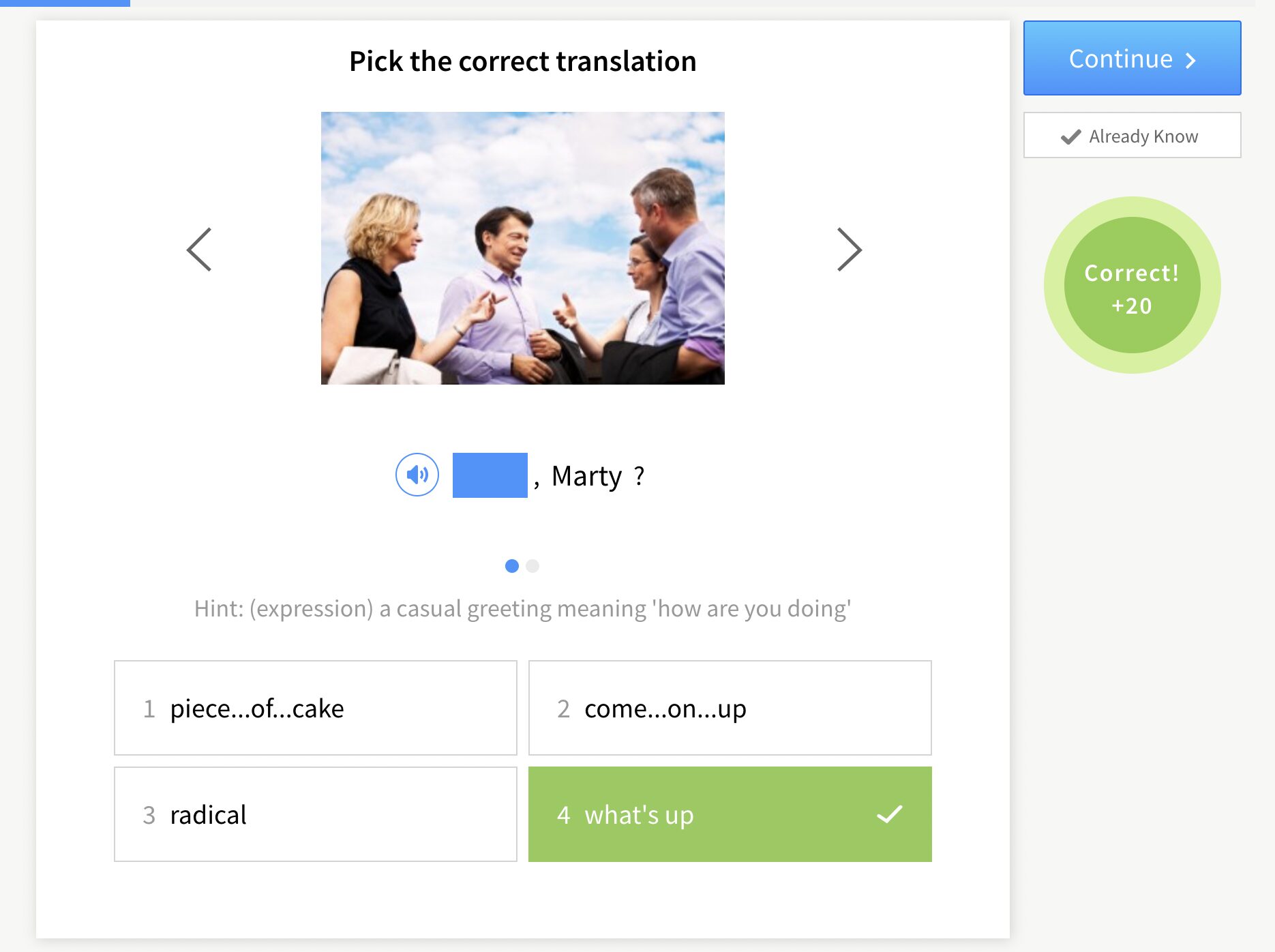Contents
- 1. Learn Sentences, Not Just Words
- 2. Don’t Just Answer Questions—Ask Questions
- 3. Plan Your Communication Ahead of Time, When Possible
- 4. Make Time for Grammar Reviews
- 5. Expand Your Vocabulary with Business News Media
- 6. Target Multiple Communication Skills at the Same Time
- Apps for Business English Communication Skills
- And One More Thing…
6 Ways to Develop Effective Business English Communication Skills

The ability to communicate well is very important in business. You could have the best idea in the world but if you aren’t clear with your supervisors and team, no one will ever know.
Build your business English communication skills with these six methods below, so that you can prepare for any situation you might find yourself in.
Download: This blog post is available as a convenient and portable PDF that you can take anywhere. Click here to get a copy. (Download)
1. Learn Sentences, Not Just Words
In many cases, simply learning a word isn’t enough. The question is: how do you use it? Instead of just memorizing important words and their definitions, I suggest that you memorize one or two sentences containing the word.
Let’s take the word clarify, for example. This word is commonly used in business English to mean “make something clearer or more understandable.”
Instead of just memorizing the word, memorize some sentences that use it:
- We need to clarify a few details.
- Maybe you could clarify what you mean by that.
- Thanks for clarifying that.
Now you can easily use these sentences at meetings or conference calls to seek a better understanding of what someone has said. When you’re comfortable using these fixed sentence structures, you’re ready to take the next step of adapting them to different situations:
- We need to clarify what she said in the last meeting.
- Maybe you could clarify how you plan to market this product.
- Thank you for clarifying your point.
When you’re confident in changing these sentences to suit different situations, then you’re ready to start constructing your own sentences.
2. Don’t Just Answer Questions—Ask Questions
As a business English learner, you’re probably more used to answering questions than asking them. You’re often most focused on what to say and how to say something, and that’s okay.
But asking questions is a necessary part of doing business as well. You often need to seek the opinions and ideas of others to get your job done. Did you know that asking questions is a great way to sharpen your listening skills and learn new business language as well?
I’m sure you’ve heard many kinds of questions from people around you at work. Some common ones include:
- What do you think of this idea?
- How do you propose we handle this?
- Are there other options we can consider?
For a start, you could memorize questions like these, and then ask them at the right time. But don’t just ask; be sure to also pay close attention to the answers you receive. While taking note of the content of the answers (which could help you do your job), also listen for new and unfamiliar language that might be useful to you.
3. Plan Your Communication Ahead of Time, When Possible
Before you embark on any kind of business communication, whether it’s to make a conference call or write an email to a customer, always take the time to think about what and how to convey your message.
Think about the grammar you’ll use. Think about the words and phrases that will make your message clearer. In other words, plan your message.
For instance, before attending a meeting, look through the agenda to see what topics will be discussed. Make notes about what you plan to say including the grammar and any words or phrases that’ll be useful. Use these to practice making meaningful sentences.
This type of preparation doesn’t just ensure that you’ll sound more competent and professional in your business communications; it also serves as extra grammar and speaking practice that’ll get you fluent faster.
4. Make Time for Grammar Reviews
While you’re focused on learning all the aspects of business English, you shouldn’t forget to work on your grammar. Using correct grammar will ensure you send clear and meaningful messages that won’t cause confusion and misunderstandings in your business communication.
Below are a few sites I think you’ll find useful for learning grammar online. Consider setting aside a specific amount of time every day, maybe while you’re getting ready for work or during lunch, to review these grammar resources.
- GrammarBook.com: GrammarBook.com offers free online English usage rules that you can use in conjunction with “The Blue Book of Grammar and Punctuation,” an excellent workbook and guide to American English grammar, punctuation and usage that’s sold on this site. You can sign up to receive their free newsletter and access their online quizzes.
- Daily Grammar: Daily Grammar features fun ways to learn and practice your English grammar skills with daily blog posts, quizzes, e-books and workbooks that let you learn at your own pace.
- Grammar Girl: Grammar Girl is another fun site with many great tips to help you understand the sometimes confusing areas of English grammar and improve more quickly. You can sign up for the newsletter to receive these tips in your email.
Use these helpful resources to practice forming meaningful and grammatically correct sentences.
5. Expand Your Vocabulary with Business News Media
One of the most effective ways to increase your vocabulary is through business news media. By reading and listening to business news, you’ll learn new words, expressions and even idioms that are relevant to the professional world.
The more you read business news, the more comfortable you’ll become with terminology related to finance, regulations and other issues that may be pertinent to your work. You’ll find many useful business news resources online such as Reuters Business News, The Harvard Business Review and NBC Business News.
A subscription to The New York Times will give you access to fresh, relevant news stories every day in their Business Day section. As this is a major news source that covers business not just in the U.S. but internationally, it’s a great way to ensure that you’re up-to-date on the latest subjects in the business world.
Most professions also have newspapers or magazines that are specific to their industry. For example, if you work in the insurance field, you might read Insurance Business Magazine. Ask your colleagues what industry-specific news outlets they read so you can start reading them, too.
As you’re reading, be sure to jot down new vocabulary and terminology commonly used in your field of business.
6. Target Multiple Communication Skills at the Same Time
Many business English learners tend to focus most of their efforts on speaking skills because speaking is so important for communicating in meetings, negotiations, job interviews, etc. However, the other communication skills—reading, listening and writing—are just as important.
Of course, you know the importance of writing in business. I’m sure you spend a good part of your workday replying to emails, writing reports and preparing other documents. One of the best ways to develop writing skills—other than constant practice—is to read actively. When you encounter useful business phrases in your reading, make sure to note them down so you can use them in your own writing.
Get your hands on any kind of business English material (books, magazines, websites, etc.) that you can and make it a habit to read as often as you can. If you need to, read and re-read the text over again until you get the idea.
Listening is important too. Listening may be challenging in the beginning because you don’t control the speed of the words, and there are many different accents and speaking styles to become familiar with. But with practice, practice, practice, you’ll find yourself understanding more and discovering how to improve your own speech and pronunciation.
Remember not to limit yourself to developing just one or two skill areas at a time. The quickest way to improve is by targeting multiple communication skills at the same time.
Apps for Business English Communication Skills
Business English Pod

Have you heard of Business English Pod? If you’ve been using their website, you can now integrate your learning into your phone. They have more than 200 business English lessons covering everything from vocabulary to grammar to practical skills for your business and technical needs.
You should definitely tune in to their business English news content to experience and learn language for real-life situations. If you’re on a tight work schedule, you may even download the listening files to take your learning offline at your own pace.
FluentU
FluentU’s English program provides engaging, real-world dialogues for a wide range of professions. It’s the most straightforward, effective way to practice the communication skills that are most relevant to your job.
FluentU takes authentic videos—like music videos, movie trailers, news and inspiring talks—and turns them into personalized language learning lessons.
You can try FluentU for free for 2 weeks. Check out the website or download the iOS app or Android app.
P.S. Click here to take advantage of our current sale! (Expires at the end of this month.)

So there you have it: two great apps and the top six ways to start sharpening your business English communication skills today.
Remember, practice makes all the difference. Now you’re all set to climb that corporate ladder. Good luck!
Download: This blog post is available as a convenient and portable PDF that you can take anywhere. Click here to get a copy. (Download)
And One More Thing…
If you’re like me and prefer learning English on your own time, from the comfort of your smart device, I’ve got something you’ll love.
With FluentU’s Chrome Extension, you can turn any YouTube or Netflix video with subtitles into an interactive language lesson. That means you can learn from real-world content, just as native English speakers actually speak.
You can even import your favorite YouTube videos into your FluentU account. If you’re not sure where to start, check out our curated library of videos that are handpicked for beginners and intermediate learners, as you can see here:
FluentU brings native English videos within reach. With interactive captions, you can hover over any word to see an image, definition, and pronunciation.
Just click on the word to see other example sentences and videos where the word is used in different contexts. Plus, you can add it to your flashcards! For example, if I tap on the word "viral," this is what pops up:
Want to make sure you really remember what you've learned? We’ve got you covered. Practice and reinforce the vocab from each video with learn mode. Swipe to see more examples of the word you’re learning, and play mini-games with our dynamic flashcards.
The best part? FluentU tracks everything you’re learning and uses that to create a personalized experience just for you. You’ll get extra practice with tricky words and even be reminded when it’s time to review—so nothing slips through the cracks.
Start using the FluentU website on your computer or tablet or, better yet, download our from the App Store or Google Play.
Click here to take advantage of our current sale! (Expires at the end of this month.)













